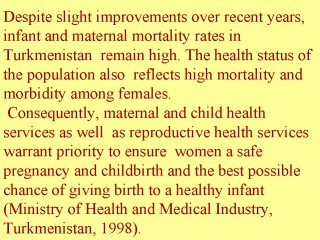 |
Infectious
diseases have remained an important problem and control of these diseases could lead to
important health gains, not only in terms of numbers of lives saved but also of improved
health status generally, because many infectious diseases can lead to sequel (such as
infertility, congenital infections and carcinoma of the cervix from sexually transmitted
diseases - STDs) or to further complications (for example, ectopic pregnancy following
salpingitis and pelvic inflammatory disease). The syphilis morbidity rate in 1998 is
seven times higher than in 1992. It should be noted however that these figures probably
underestimate the real problem since estimates of health care seeking behaviour is about
30%. At present there are only two official cases of HIV/AIDS registered in Turkmenistan.
Given the rapid increase in the incidence of sexually transmitted infections (STIs) in the
last 8 or so years and the common way in which they can be transmitted the risk of
considerably higher levels of HIV/AIDS is realistic. A major issue concerns the lack of
equipment to test for HIV/AIDS. The National Programme on the Prevention of HIV/AIDS/STIs
was adopted in September 1999 for a 5-year period aiming to the decrease morbidity from
STIs and to prevent the spread of HIV/AIDS. The programme still requires significant
support through improved public awareness. |
